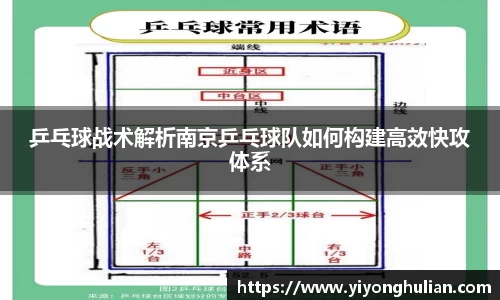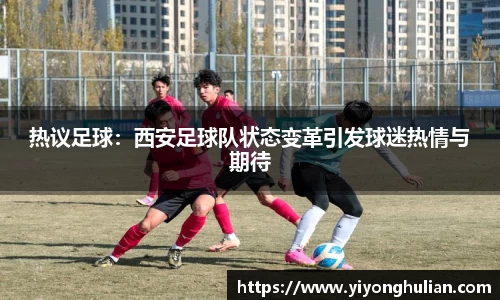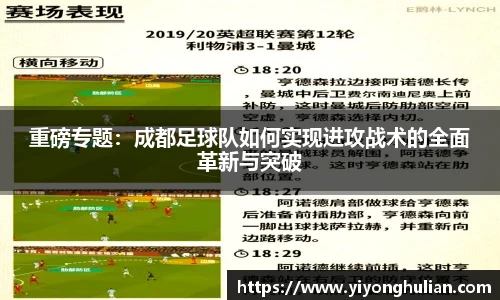乒乓球战术解析南京乒乓球队如何构建高效快攻体系
高效快攻体系概述
南京乒乓球队在近年来的快速崛起中,构建了一套高效的快攻体系,这不仅是团队战术的体现,也是球员个人技能和心理素质的全面提升。本文将从战术理念、技术训练、心理建设和团队协作四个方面,对南京乒乓球队如何构建这一体系进行深入解析。首先,团队明确了快攻作为主要战术方向,通过快速反击压制对手;其次,针对快攻所需的技术要点进行了系统性训练;再次,心理因素被重视,以提高球员在比赛中的应变能力;最后,强调团队协作的重要性,使得每位成员都能在整体战术中发挥最大效能。通过这四个层面的详细分析,我们将能够更清晰地理解南京乒乓球队为何能够在激烈竞争中脱颖而出,并形成一支高效且具有攻击性的队伍。
战术理念与方向明确
南京乒乓球队的快攻体系首先体现在其明确的战术理念上。在现代乒乓球比赛中,速度和反应能力成为决定胜负的重要因素。南京队通过比赛数据分析和对手研究,将快攻作为核心策略,以此来实现对比赛节奏的控制。这种以主动进攻为主的战术,不仅能够迅速施压对手,还能有效降低防守时被反击的风险。
通过制定严谨的战术计划,教练组引导球员在实战中灵活运用快攻技巧,如正手强攻、侧身抽球等,使得选手们在场上能自如地切换不同打法。这种多样化的攻击方式帮助队伍在面对不同风格对手时,保持了良好的适应能力。同时,该队还注重培养球员之间相互配合,以形成更具威胁性的攻击组合。

此外,在实际比赛中,南京队也不断根据场上的变化及时调整策略,例如面对特定对手时可能会选择加强边路进攻或是直线冲击,从而达到出奇制胜之效果。这样的灵活应变使得他们在赛季中的表现愈发稳健,并逐渐树立起“快速、果断”的形象。
技术训练与细节把控
Nanjing ping pong team's efficient fast attack system is built on rigorous technical training. The coaching staff has designed a comprehensive training program that emphasizes various techniques essential for fast attacks. First and foremost, players are trained to improve their reaction speed and ball control skills, enabling them to make split-second decisions during matches.
The focus of the training includes drills on footwork, positioning, and shot selection. Players practice moving quickly into optimal positions to execute powerful shots while maintaining balance. Specific exercises are designed to enhance hand-eye coordination, allowing athletes to respond swiftly to opponents' serves and returns. This meticulous attention to technical details enhances overall performance in high-pressure situations.
Additionally, the team integrates video analysis into their training regimen. By reviewing match footage together with players, coaches can pinpoint areas for improvement and reinforce effective techniques. This feedback loop fosters a culture of continuous learning among the athletes as they strive for perfection in their execution of fast attacks.
心理建设与状态调整
Nanjing table tennis team's success in building an efficient fast-attack system also owes much to its emphasis on psychological conditioning. In competitive sports, mental resilience plays a crucial role in determining outcomes; therefore, the team invests significant resources into developing players' mental strength. Techniques such as visualization and mindfulness practices are incorporated into regular training routines.
The coaching staff conducts workshops focused on mental preparation before important matches, helping players cultivate a positive mindset and manage anxiety effectively. Strategies such as setting specific performance goals during competitions empower athletes to concentrate on executing their skills rather than worrying about winning or losing.
This psychological foundation allows players to maintain composure during critical moments in matches when pressure is at its peak. As a result, they can trust their instincts and rely on their training when faced with challenging situations—enabling them to execute rapid attacks with confidence.
团队协作与配合默契
A key component of Nanjing’s successful fast-attack system lies in the emphasis placed on teamwork and collaboration among players. The coaching philosophy encourages open communication both on and off the court so that each member feels valued within the team structure. Regular team-building activities foster camaraderie and trust among teammates, which translates into better performance during matches.
The tactical approach adopted by Nanjing incorporates coordinated movements where each player understands their role within the larger framework of fast attacks. For instance, while one player initiates an aggressive play from the forehand side, others position themselves strategically for follow-up shots or potential interceptions—creating opportunities for continuous offensive pressure against opponents.
This level of synergy not only elevates individual performances but also maximizes collective strengths as a unit. It enables quick transitions between offense and defense while maintaining an aggressive stance throughout games—a hallmark trait that distinguishes Nanjing’s playing style from competitors.
总结与展望
Nanjing table tennis team's construction of an efficient fast-attack system encompasses strategic clarity, technical precision, psychological fortitude, and seamless teamwork—all integral facets contributing towards creating a formidable force in competitive settings. By focusing intently on these aspects through structured training regimens coupled with adaptable game strategies tailored for different opponents—they have successfully carved out their niche within national rankings.
The future looks promising as continued investment into player development alongside fostering innovation within tactics will likely yield even greater achievements ahead for this dynamic team environment—further solidifying its reputation not just locally but nationally within China’s rich tapestry of table tennis excellence.


